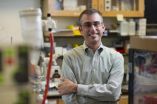(Press-News.org) In early drug discovery, you need a starting point, says Northeastern University associate professor of chemistry and chemical biology Michael Pollastri.
In a new research paper published Thursday in the journal PLOS Neglected Tropical Diseases, Pollastri and his colleagues present hundreds of such starting points for potentially treating African sleeping sickness, a deadly disease that claims thousands of lives annually.
Pollastri, who runs Northeastern's Laboratory for Neglected Disease Drug Discovery, and co- collaborators at the Spanish National Research Council for Scientific Research worked with global healthcare company GlaxoSmithKline to screen and test more than 42,000 chemical compounds against the parasites that cause African sleeping sickness. In their paper, they report identifying nearly 800 compounds that represent good options for early drug discovery.
"Having this many good starting points for discovery of new drugs for sleeping sickness is a big deal and could ultimately lead to a cure," Pollastri said.
Pollastri also highlighted another exciting component to this project. Previously, he created a data- sharing portal where scientists and researchers can access and contribute to each other's work on neglected tropical diseases. This new research on African sleeping sickness will be the first data to be deposited on the portal, which was supported by a crowdfunding campaign.
"This is a venue where other people, particularly medical chemists from around the world, can contribute to the project in one way or the other," Pollastri said.
African sleeping sickness is one of the World Health Organization's 17 neglected tropical diseases. It is found only in sub-Sahara Africa and infects between 10,000 and 30,000 people annually. Tsetse flies transmit the disease and symptoms come in two stages. In the first stage an infected person experiences symptoms such as fever, headaches, joint pains, and itching. In the second stage, parasites enter the person's central nervous system and that leads to sleep cycle disruption, coma and, if untreated, death.
"It is a nasty, nasty disease," said Pollastri, adding that it hasn't been widely researched and that even the current drug treatments are lengthy, toxic, and often fatal themselves.
Pollastri and his co-collaborators worked with Dr. Miguel Navarro at the Spanish National Research Council in Granada, Spain, and with GlaxoSmithKline's OpenLab initiative to run the screenings, which focused on inhibitors that block the process of phosphoryl transfer mediated by enzymes called kinases. This process is a key step in cellular signaling, and kinase inhibitors have been historically pursued for potential treatment of some cancers and inflammatory disorders, he explained.
The next step will involve continued testing on these promising 800 compounds and determining which ones can be tweaked in order to have the right potency, properties, and lack of toxicity to treat the disease, he said. At that point, they may be able to advance a compound toward clinical trials for sleeping sickness.
INFORMATION:
WASHINGTON – October 24, 2014 – Policy options for climate change risk management are straightforward and have well understood strengths and weaknesses, according to a new study by the American Meteorological Society (AMS) Policy Program.
"Large gaps remain in society's consideration of climate policy," said Paul Higgins, the author of the study. "This study can help in the development of a comprehensive strategy for climate change risk management because it explores a much larger set of policy options."
The study identifies four categories of climate ...
Washington, D.C., October 24, 2014 -- Only 6 percent of U.S. hospitals are well-prepared to receive a patient with the Ebola virus, according to a survey of infection prevention experts at U.S. hospitals conducted October 10-15 by the Association for Professionals in Infection Control and Epidemiology (APIC).
The survey asked APIC's infection preventionist members, "How prepared is your facility to receive a patient with the Ebola virus?" Of the 1,039 U.S.-based respondents working in acute care hospitals, about 6 percent reported their facility was well-prepared, while ...
LAWRENCE – 'Call your mother' may be the familiar refrain, but research from the University of Kansas shows that being able to text, email and Facebook dad may be just as important for young adults.
Jennifer Schon, a doctoral student in communication studies, found that adult children's relationship satisfaction with their parents is modestly influenced by the number of communication tools, such as cell phones, email, social networking sites, they use to communicate.
Schon had 367 adults between the ages of 18 and 29 fill out a survey on what methods of communications ...
VIDEO:
The Jones lab details a new target to fighting HIV.
Click here for more information.
LA JOLLA—Like a slumbering dragon, HIV can lay dormant in a person's cells for years, evading medical treatments only to wake up and strike at a later time, quickly replicating itself and destroying the immune system.
Scientists at the Salk Institute have uncovered a new protein that participates in active HIV replication, as detailed in the latest issue of Genes & Development. ...
Spectacular eruptions at Bárðarbunga volcano in central Iceland have been spewing lava continuously since Aug. 31. Massive amounts of erupting lava are connected to the destruction of supercontinents and dramatic changes in climate and ecosystems.
New research from UC Davis and Aarhus University in Denmark shows that high mantle temperatures miles beneath the Earth's surface are essential for generating such large amounts of magma. In fact, the scientists found that the Bárðarbunga volcano lies directly above the hottest portion of the North Atlantic ...
Harvard Stem Cell Institute scientists at Massachusetts General Hospital have devised a new way to use stem cells in the fight against brain cancer. A team led by neuroscientist Khalid Shah, MS, PhD, who recently demonstrated the value of stem cells loaded with cancer-killing herpes viruses, now has a way to genetically engineer stem cells so that they can produce and secrete tumor-killing toxins.
In the AlphaMed Press journal STEM CELLS, Shah's team shows how the toxin-secreting stem cells can be used to eradicate cancer cells remaining in mouse brains after their main ...
A new study has found that implementing stricter fisheries management overcame the expected detrimental effects of climate change disturbances in coral reef fisheries badly impacted by the 1997/98 El Niño, according to the Wildlife Conservation Society.
The 17-year study led by WCS fisheries scientists found that rapid implementation of fisheries restrictions countered adverse climate effects and actually increased fisheries catches, counter to predictions and findings in other studies without stricter management. This is good news for the millions of people who ...
Physics researchers at Virginia Commonwealth University have discovered that most of the electrolytes used in lithium-ion batteries — commonly found in consumer electronic devices — are superhalogens, and that the vast majority of these electrolytes contain toxic halogens.
At the same time, the researchers also found that the electrolytes in lithium-ion batteries (also known as Li-ion batteries) could be replaced with halogen-free electrolytes that are both nontoxic and environmentally friendly.
"The significance [of our findings] is that one can have a ...
Rockville, MD –Disaster Medicine and Public Health Preparedness Journal has released a novel, informative article that speaks to volunteers within the Ebola epidemic. The article, contributed by a consortium of Boston-based hospitals, is entitled Sign Me Up: Rules of the Road for Humanitarian Volunteers during the Ebola Outbreak. The authors paint an honest picture of volunteer circumstances, and ask those considering volunteering to not make the decision lightly. They insist that the "global healthcare community must and will rise to serve."
The World Health Organization ...
NASA's TRMM satellite saw that Tropical Storm Ana was still generating moderate rainfall is it pulled away from Hawaii. The next day, NASA's Aqua satellite saw that wind shear was having an effect on the storm as it moved over open ocean.
On Oct. 24, Ana had moved far enough away from land areas that there were no watches or warnings in effect.
The Tropical Rainfall Measuring Mission (TRMM) satellite flew over tropical storm Ana on October 22, 2014 at 1935 UTC (about 8:30 a.m. HST local time). Ana formed over ten days ago but after moving to the northwest of the Hawaiian ...




